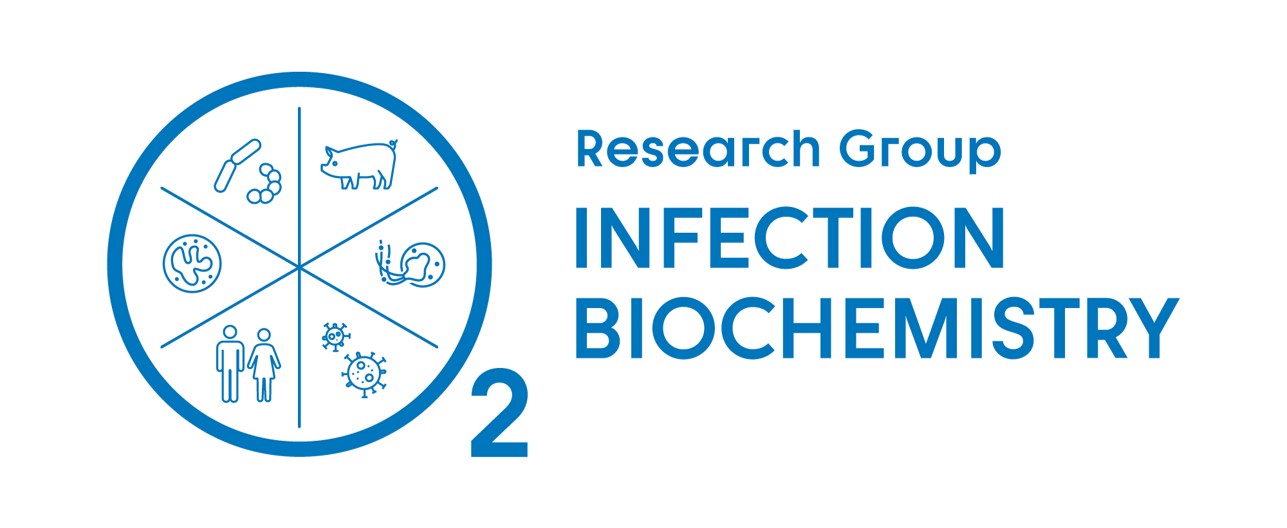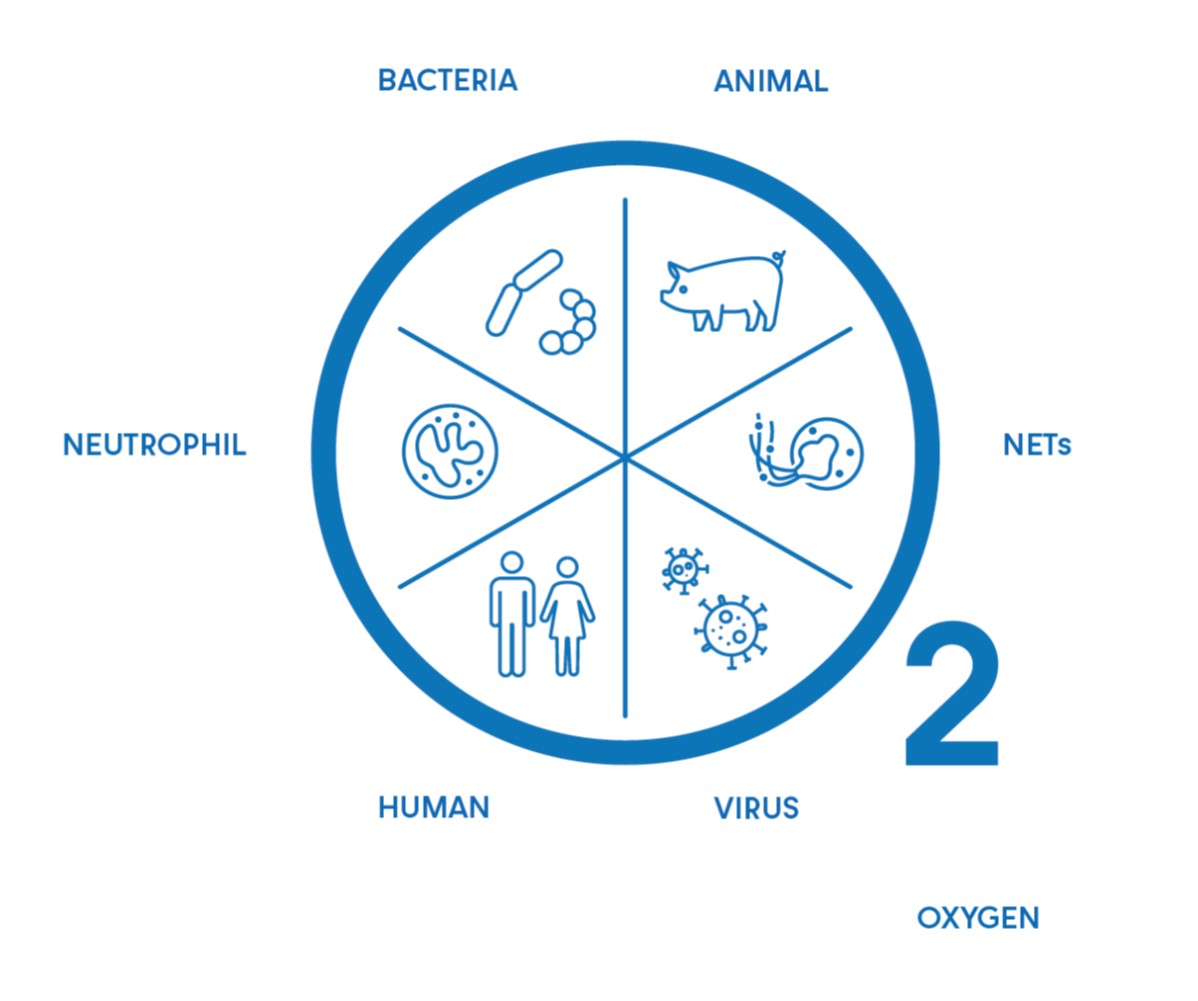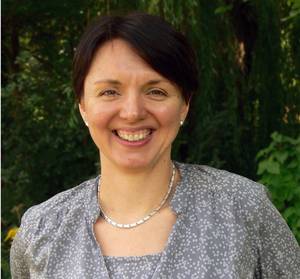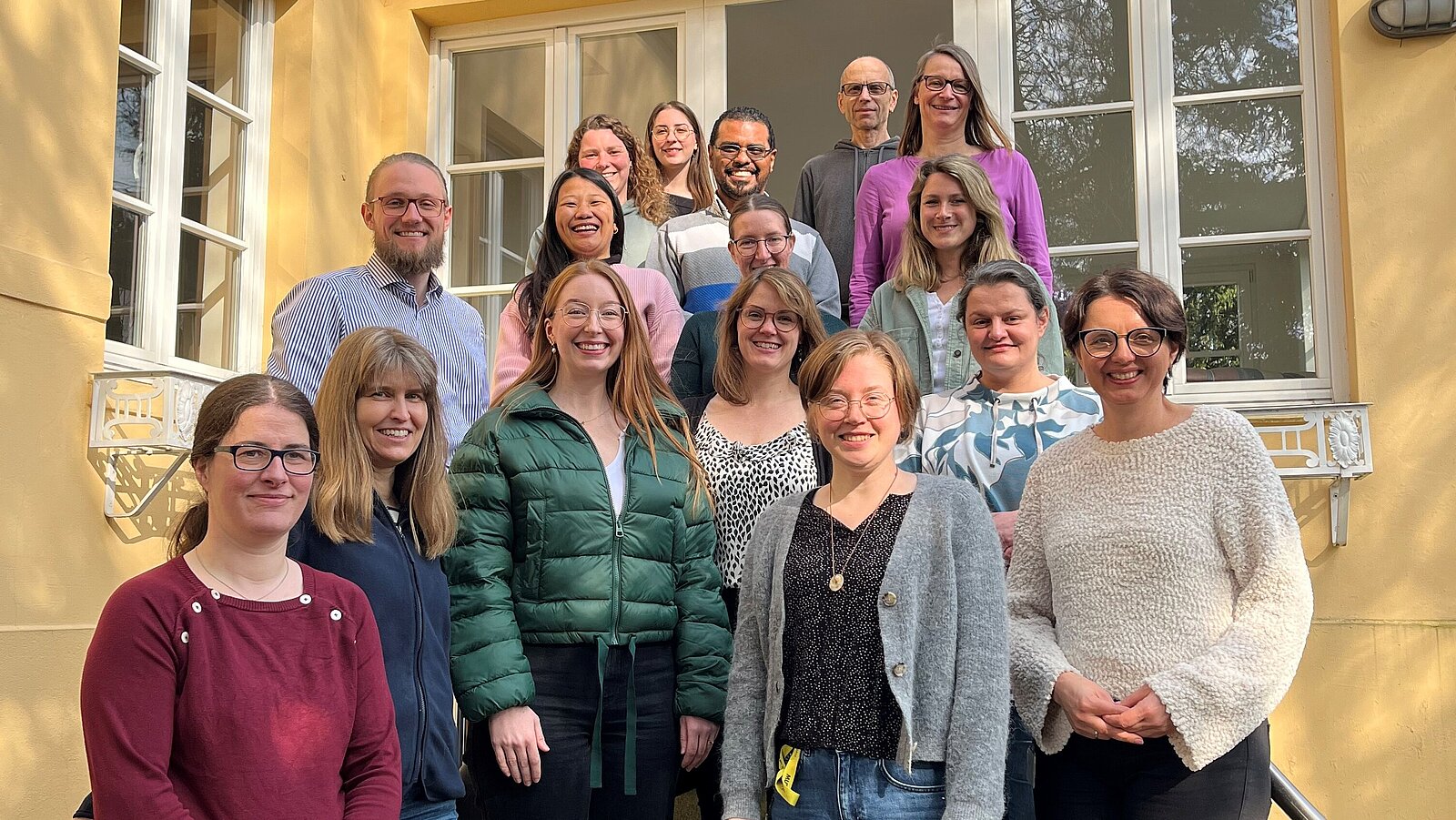
Research Goal
The Immune System in the Fight Against Infectious Diseases: New Therapeutic Approaches for Humans and Animals: The Infection Biochemistry working group headed by Prof. Maren von Köckritz-Blickwede deals with the mechanisms of the innate immune response against bacterial and viral diseases in humans and animals. The increased occurrence of antibiotic-resistant bacteria or viral diseases such as COVID-19, which can be transmitted from animals to humans, are causing increasing difficulties in the health system. The aim of this study is to combine different main areas of biomedical research for the search for new therapeutic and prophylactic approaches against zoonotic infectious diseases: microbiology, cell biology, biochemistry and immunology. In the working group, the scientists investigate whether and how drugs, natural substances or feed additives can support the immune system in the fight against infectious diseases in humans and animals. A special focus is on the effect of hypoxia on the immune response in the context of infection.
These questions are also currently being used intensively in the context of COVID-19 research.
The current work on SARS-CoV-2 research is also an essential part of the COVID-19 Research Network Lower Saxony (COFONI).
Hypoxia: Optimizing Animal Replacement Methods
In most studies, cells and tissues are cultured under atmospheric oxygen concentration as standard, although these are significantly lower in most tissues in vivo. In the event of an infection and the resulting inflammation, there is a massive decrease in the oxygen level, a so-called hypoxia, which can significantly influence the host-pathogen interaction. Investigations that characterize the host's pathogen defense under physiological oxygen conditions are therefore absolutely necessary in order to better understand the basic reactions of the cell and to be able to develop new therapeutic and prophylactic approaches. In addition to vaccines, for example, strengthening the host's own defenses by stimulating the immune system as a support for conventional therapy for a COVID-19 infection can be a promising new approach. For this, it is necessary to precisely clarify the complex host-pathogen interactions.
However, due to a lack of complexity, an incorrect cell differentiation status and a lack of physiological conditions, in vitro systems do not always precisely simulate the in vivo situation during infection or inflammation. Results from conventional in vitro experiments that investigate host-pathogen interaction or therapeutic approaches often contradict data from in vivo studies and are therefore difficult to transfer. Animal-free test systems for infection and interaction studies as well as for drug screenings are only a real alternative if the results obtained can be reliably transferred to an in vivo situation. Our goal is therefore to establish a more complex in vitro model system with the help of hypoxia research in order to enable a better approximation of the in vivo situation and thereby reduce the number of test animals.
This work also makes a contribution to future-oriented research without animal experiments in Lower Saxony (R2N).

Neutrophil Granulocytes
Our immune system has developed various strategies to prevent pathogens from spreading in our body. Neutrophils are part of the white blood cells and are part of this system. They have developed three different strategies to fight off pathogens. Two of them have long been known: the incorporation and destruction of pathogens, known as phagocytosis, and the release of antimicrobial substances, which also ensure that pathogens are killed. A third mechanism that white blood cells use to protect the body from infectious agents was discovered in 2004: outside the cell, neutrophils produce a fibrous structure made up of DNA, antimicrobial peptides and histones. These newly discovered DNA nets are known as Neutrophil Extracellular Traps, or shortly NETs. NETs can bind pathogens and, as a physical barrier, prevent them from spreading further. In addition, numerous harmful effects are also known. Excess NET formation can lead to thrombosis or autoimmune disorders. A healthy balance of NET-formation and elimination is therefore of great importance for the immune response against infections.
In the Infection Biochemistry Research Group, the scientists are looking for ways to modulate the formation of these NETs or the other defense strategies of immune cells. The aim is to characterize new therapeutic approaches that strengthen the immune system in the fight against bacterial infections or weaken the virulence of the infectious agents.

Head of the Group
Prof. Dr. Maren von Köckritz-Blickwede

Prof. Dr. Maren von Köckritz-Blickwede studied biology at the University of Hanover. During this time, she spent one year at the Universidad Nacional de Heredia, Costa Rica, where she performed epidemiological studies about vesicular stomatitis viruses in horses in Costa Rica. In 2001 she completed her Diplom research studies with the title “Isolation and characterization of metabolically competent pulmonary epithelial cells from pig and rat lung tissue for the use in biotransformation and toxicity studies” at the Fraunhofer Institute for Toxicology and Experimental Medicine in Hanover, Germany.
After graduation, she started a Ph.D. research fellowship of the DFG-graduate school "Mucosal Host-Pathogen Interactions" at the Federal Agricultural Research Centre for Animal Science in Neustadt-Mariensee, Germany. The topic of her PhD thesis was: “Antibiotic-dependent modulation of staphylococcal virulence properties”. She received her Dr. rer. nat. title in December 2004 at the University of Veterinary Medicine in Hannover, Germany.
After that she spent three years as a PostDoc at the Helmholtz Centre for Infection Research in Braunschweig, Germany, where she studied the role of host genetic and immune factors involved in the susceptibility and resistance against Streptococcus pyogenes and Staphylococcus aureus infections. During this time she discovered that mast cells have the ability to kill bacterial pathogens by the formation of antimicrobial extracellular traps (Blood, 2008).
Based on this work, she obtained a prestigious grant from the Deutsche Akademie der Naturforscher Leopoldina to study the role of extracellular traps during bacterial infections, to identify bacterial strategies that avoid entrapment and killing by these structures, and to search for novel pharmacological agents that boost the formation of extracellular traps. She performed these studies from September 2008 until June 2010 in the laboratory of Prof. Victor Nizet, at the University of California, San Diego School of Medicine, La Jolla, California. Her research shed new light on the importance of extracellular traps in host defense and provides new therapeutic opportunities to enhance the local innate immune response against bacterial infections.
Since July 2010 Dr. Maren von Köckritz-Blickwede is leading the research group Infection Biochemistry at the Department of Physiological Chemistry and is continuing her research on the host innate immune defense (with special focus on extracellular traps) as therapeutic target against bacterial infections. In February 2015 she received the position as a full professor for Biochemistry of Infection at the Department of Physiological Chemistry and the Research Center for Emerging Infections (RIZ), TiHo.
Since April 2019 Prof. Dr. Maren von Köckritz-Blickwede has been "Director for Scientific Administration and Biosafety" at the RIZ of TiHo.
Team de Buhr
Veterinarian PD Nicole de Buhr, PhD
Host-Pathogen Interaction in Bacterial Infections (in vivo / in vitro)
The DNA networks of neutrophils play an important role in defense against pathogens. This interaction is being investigated in various projects with a main focus on the brain (meningitis) and the lungs. A broad spectrum of bacterial pathogens is analyzed in interaction with the host cells, depending on the animal species / human and organ. The following bacterial pathogens are part of ongoing research projects:
Streptococcus suis, Streptococcus canis, Haemophilus parasuis, Actinobacillus pleuropneumoniae, Haemophilus influenzae, Pseudomonas aeruginosa, Pasteurella multocida, Stapyhlococcus aureus, Staphylococcus pseudintermedius, Escherichia coli.
The aim of the host-pathogen interaction study is to understand these between neutrophils and pathogens and to derive new treatment strategies from them. From an initially close examination of two interaction partners (pathogen and a host cell), increasingly complex systems then emerge. These make it possible to explain the observations in humans and animals. The in vitro systems are expanded from simple to more complex systems for the understanding of diseases.
Host-pathogen interaction in co-infections (bacteria - bacteria and virus - bacteria)
An important research focus in the increasingly complex systems is the co-infection. In the context of a study, a dogma break in the area of the function of DNA networks could be shown. The DNA networks are originally described as being able to trap and kill bacteria. However, some pathogens can break free from this mechanism through the production of DNases. However, research has shown that bacteria belonging to the Pasteurellaceae family can use degraded DNA networks as growth promoters. The combination of biochemical analyzes and microbiological evaluations was able to show and explain this exciting breach of dogma.
Building on this, a new project was initiated to analyze the co-infection of viruses and bacteria and the interaction with DNA networks in the lungs in more detail. The complex interaction of influenza A virus (IAV) and bacterial lung pathogens with the immune system in the context of a co-infection has not been adequately scientifically explained. One research focus is therefore to understand how complex co-infections and the host interact and, if necessary, also influence one another.
3D cell culture models of barriers, especially under infection conditions
A system used in many projects are 3D cell culture models of barriers that protect particularly immune-privileged compartments of the body. These include the blood-liquor barrier and the blood-retina barrier. By using transwell systems on which e.g. choroid plexus cells grow, transmigration studies of neutrophils can be carried out and these transmigrated neutrophils can be analyzed using various techniques (RNA; protein, flow cytometry, immunofluorescence microscopy). In the ongoing projects, the systems are infected and the transmigration of neutrophils is analyzed.
In addition, a strong focus has been placed on using the systems under pathophysiological and physiological conditions. Extensive in vivo studies and the use of body fluids such as cerebrospinal fluid and whole blood enable this adaptation and help to develop cell culture media adapted for the future in order to generate systems close to in vivo. All of these projects help to reduce animal experiments and to develop alternative alternatives in the long term.
Team Meurer
Veterinarian Marita Meurer, PhD
Marita Meurer studied veterinary medicine at the University of Veterinary Medicine in Hanover and received her license to practice medicine here in 2001.
After various research work in industry and the public sector, she returned to the University of Veterinary Medicine in Hanover in March 2017.
Until 2020 Marita was a doctoral candidate in the PhD program "Animal and Zoonotic Infections" at the Hanover Graduate School for Veterinary Pathobiology, Neuroinfectiology, and Translational Medicine (HGNI) of the University of Veterinary Medicine Hannover. Marita was supervised by Prof. Dr. Maren von Köckritz-Blickwede and Dr. Nicole de Buhr.
The aim of her work is to research the innate immune defense of pigs against the zoonotic pathogen Streptococcus suis. Their findings should contribute to a better understanding of the host-pathogen interaction during bacterial meningitis. The aim is to develop new treatment approaches for meningitis and thus to reduce the use of antibiotics in food-producing animals.
Expertise and Methods
- Application of hypoxia in cell culture
- Extracellular and intracellular oxygen measurements in cell culture
- In vivo oxygen measurements (free oxygen) in tissue and body fluids
- Isolation of primary neutrophils from human and animal blood
- Isolation of mast cells from mouse bone marrow
- Air-liquid interface (ALI) cultures (Caco-2 cells)
- Coculture neutrophils with epithelial cells in the 3D model
- Lipid analysis (HPLC cholesterol and oxysterols)
- In vitro models of plexus epithelial cells (blood-cerebrospinal fluid barrier)
- Confocal fluorescence microscopy
- Assays for the quantification and functional analysis of neutrophil extracellular traps
- Assays to determine the antimicrobial activity of neutrophils and mast cells
- In vivo animal models
- BSL-2 and BSL-3 Laboratory and Animal Husbandry



